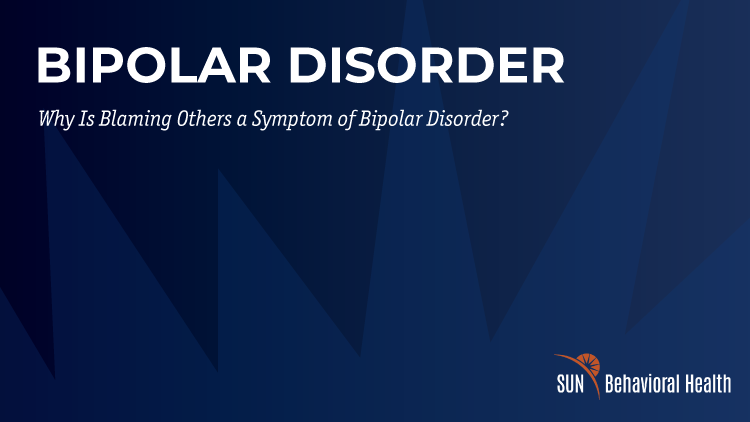Services
- Home
- Mental Health Services
- Who We Treat
- How We Treat
- Patients & Visitors
- About
close

A man waited around the corner of the kitchen. His wife was in this kitchen, but he wasn’t sure which version of her he would have today. She had been diagnosed with bipolar disorder but refused to take her medication, no matter how hard he tried. Whenever he tried to get her to take them, she would say, “I’m perfectly fine. Living with you is the reason I am this way. I don’t need that medication. I need you to stop being you.” He didn’t like that she felt this way, and it was getting harder not to believe her when she blamed him for her actions.
In 2018, approximately 57,295 people in Texas had bipolar disorder. SUN Behavioral Health Houston understands that moments of crisis never happen when it is the most convenient. You might face a crisis on a holiday or at night when offices are closed. We offer 24/7 crisis care that will allow you to get started on treatment in the middle of the crisis.
Bipolar disorder can result in experiences of emotions and behaviors. People who have bipolar disorder might blame others for their shortcomings because of the symptoms associated with the disorder. Today, we are going to discuss bipolar disorder and blaming others.

Bipolar disorder can make it difficult for someone to maintain healthy relationships. It is not impossible, but it can be challenging and involve effects from both people. Bipolar disorder can make communication difficult, which can hinder trust. Cycling through mania and depression can lead the partner of someone with bipolar disorder to have complicated feelings about their relationship. When the stresses of life come, it can make bipolar symptoms worse. These worsened symptoms might make the person with bipolar disorder’s partner feel like they must walk on eggshells around them.
There are several types of bipolar disorders. These types can result in different intensity levels in symptoms and different lengths at which those symptoms present themselves before their mood changes. However, many people with bipolar disorder might exhibit hostile or defiant behaviors, including blaming others. This behavior can be challenging for the accused person, but remember, it is not anyone’s fault. Blaming others can be a sign of bipolar disorder, and there are several reasons someone might exhibit bipolar behaviors that have nothing to do with you. It can come from genetics or traumatic events from the person’s past.
When someone with bipolar disorder experiences mania, they encounter several symptoms. They might have high self-esteem where they think they are invincible and have more energy than usual. Some people become easily distracted during these episodes, while others might be completely absorbed in an activity. They are also more likely to have impulsive behaviors during these episodes, which leads to them making poor choices. When the crash of depression comes, they might feel shame and guilt for those actions or overwhelmed by the actions they participated in. Those emotions are often very uncomfortable and challenging to manage alone. As a result, they will try to pass those feelings off as blame to other people.
Like mania, depressive episodes can also result in people blaming others for their symptoms. People want to feel good about themselves. However, depression can put that in jeopardy. Many people who are depressed will have feelings of hopelessness, pessimism, and guilt. They might have a loss of interest in activities that they usually enjoy. During depressive episodes, irritability can be present alongside sadness and anxiety. They might have thoughts of suicide or make suicide attempts. These feelings are uncomfortable and can be emotionally painful for those who experience them. Because of this, people with bipolar disorder might turn to blaming others during their depressive episodes in an attempt to remove the blame and guilt they feel about themselves.
Often, people will blame others as a way to cope with painful emotions or other bipolar triggers that they might have. Usually, the person with bipolar disorder might be overwhelmed by their emotions, especially those associated with the consequences of behaviors that occurred during a manic or depressive episode. By blaming others, they can take a chance at avoiding responsibility for those actions. Feelings of betrayal towards their condition are common in those with bipolar disorder. Blaming others allows them to get the anger out that they feel.
They might also fear being abandoned because of the difficulties associated with their disorder, and blaming others can be a way to cope with those fears. Their partner may be enabling them by accepting the blame put on them. When people with bipolar get away with blaming their actions on someone else, they can continue to feel like they don't need bipolar disorder treatment. They don't have to deal with fears that can be associated with treatment, like the fear of the unknown or fear of change if their behaviors are someone else's fault.

Encourage your loved ones that they are not alone in their bipolar disorder and that treatment is possible. They do not need to fear treatment and remind them that you will support them through the process. Bipolar treatment is typically a combination of medications and counseling. While bipolar disorder is lifelong, treatment can help people manage their symptoms. Understand that if your loved one experiences a bipolar relapse, it does not mean they have failed or cannot improve. Treatment can be a flexible experience. Just because one thing worked once doesn't mean it will always work. At any point, a medical professional might adjust their treatment if necessary.
Medications can help balance the highs and lows of emotions. Your medical professional will recommend participating in therapies, such as cognitive behavioral therapy (CBT). CBT can help your loved one identify the triggers that might worsen their symptoms. Participating in therapies like these lowers the chances of them placing blame on others. Family therapy can give you an understanding of your loved one's specific situation regarding why they blame others and how you can help them through difficult emotions.
Located in Houston, TX, SUN Behavioral Health Houston solves unmet needs in our community. We offer no-cost care assessments with telehealth options so you can meet with a representative before starting your treatment. For more information or to get started on bipolar treatment today, call us at 713-796-2273.
Bipolar people do not necessarily mean the hurtful things that they say. The symptoms that they have can lead to anger or irritability. They don't necessarily mean the things they say during these moments.
While bipolar disorder does not necessarily have manipulation as a symptom, people who have bipolar disorder may have this behavior to satisfy an emotion or circumstance that they are dealing with.
Several mental health disorders might blame other people. They could have bipolar disorder or a personality disorder such as antisocial personality disorder.